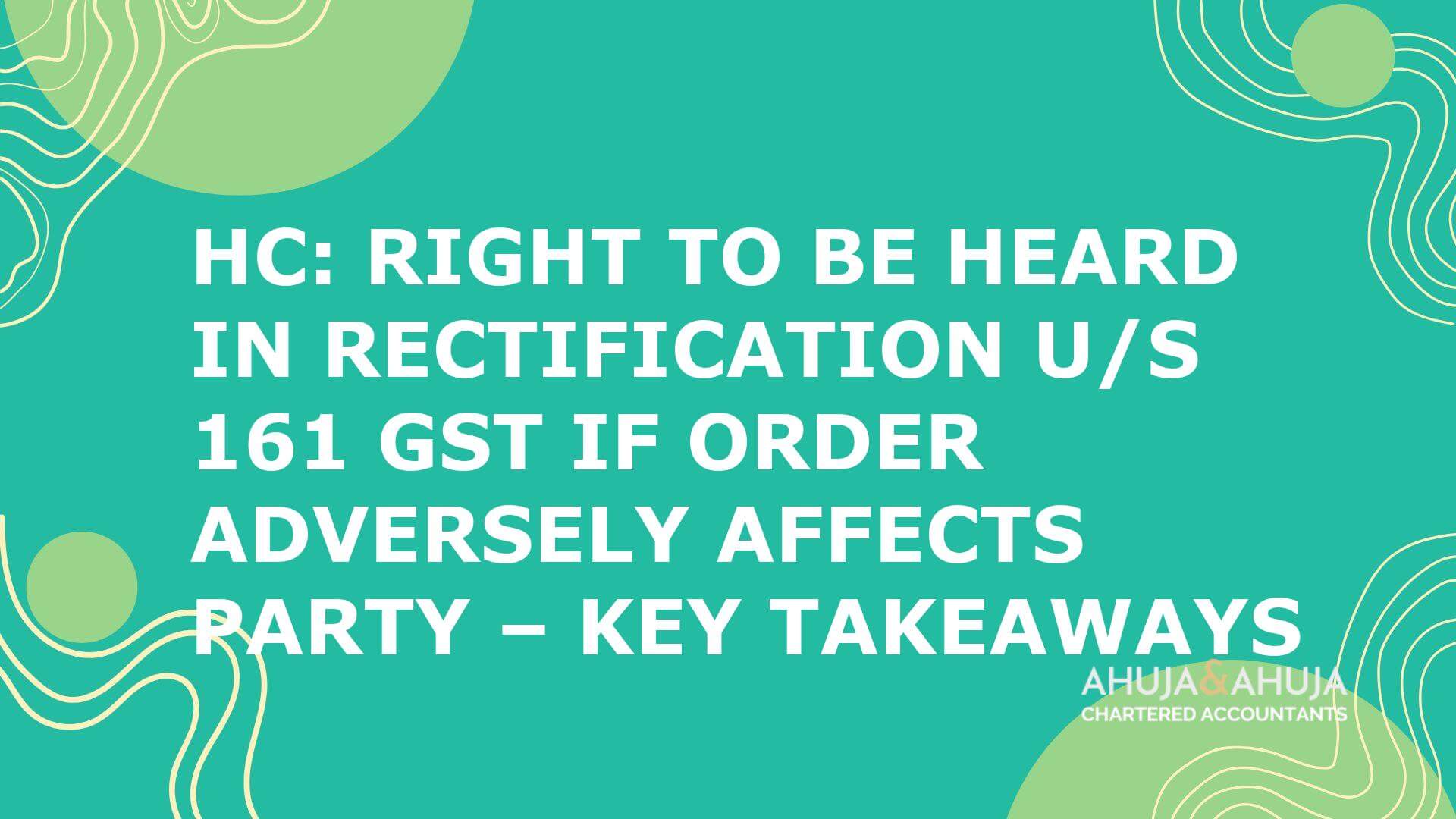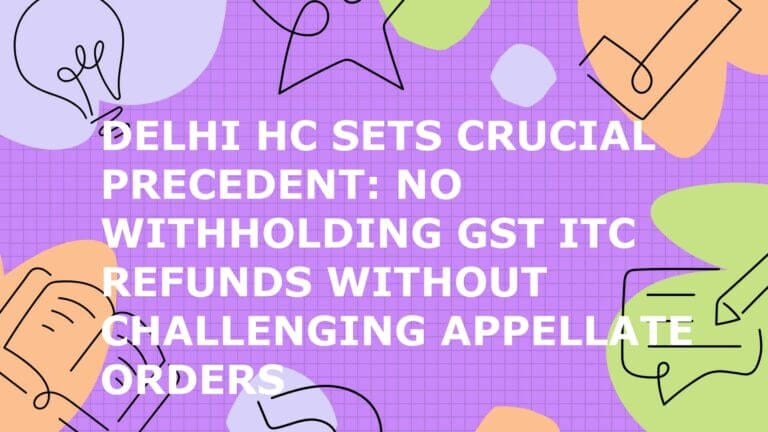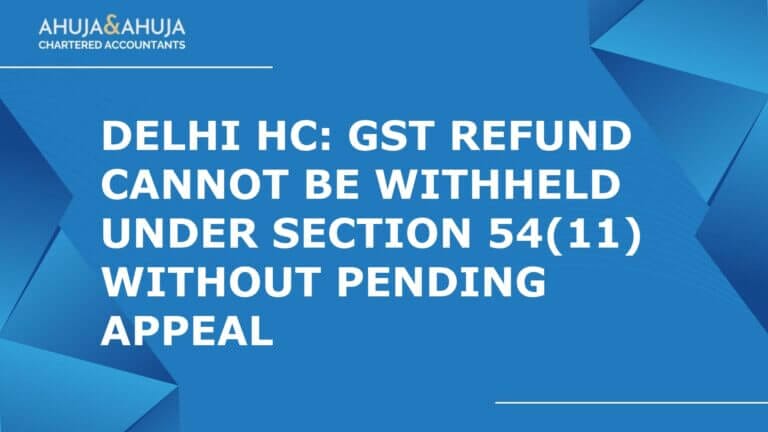HC: Right to Be Heard in Rectification u/s 161 GST if Order Adversely Affects Party – Key Takeaways
The principle of natural justice—no one should be condemned unheard—is a cornerstone of Indian tax law. Its relevance is especially pronounced in GST proceedings, where the stakes for businesses and individuals can be significant. The recent Delhi High Court decision in M/s Mark Agencies vs. Department of Trade and Taxes & Anr. has brought fresh clarity to the procedural rights of taxpayers during rectification proceedings under Section 161 of the CGST Act. This article unpacks the legal interpretation, practical implications, and strategic guidance arising from this important judgment.
Understanding Section 161 of the CGST Act: The Legal Bedrock
Section 161 empowers GST authorities to rectify “errors apparent on the face of record” in any order, notice, or document. While the provision is designed to correct obvious mistakes—such as clerical or arithmetical slips—it also embeds a crucial safeguard: the right to be heard if the rectification order is likely to adversely affect any person.
The third proviso to Section 161 reads:
“…where such rectification adversely affects any person, the principles of natural justice shall be followed by the authority carrying out such rectification.”
This language is not mere formality. It enshrines a procedural right that cannot be bypassed, even in what may seem like a routine correction exercise.
Judicial Interpretation: The Delhi High Court’s Reasoning
In the Mark Agencies case, the High Court was unequivocal. The Sales Tax Officer had rejected the taxpayer’s rectification application—pointing out errors in a prior demand order—without granting a personal hearing. The Court found this to be a clear violation of the third proviso to Section 161.
Key points from the judgment:
- Natural Justice is Non-Negotiable: The Court reaffirmed that whenever a rectification order is likely to go against a party, a hearing is mandatory. This is not a technicality but a substantive right.
- Precedent Matters: The Court relied on its own earlier decision in HVR Solar Pvt. Ltd. and the Madras High Court’s ruling in Suriya Cement Agency, both of which stressed the need for a hearing before passing an adverse rectification order. (Read more in our detailed blog on Right to Personal Hearing In Case of Adverse Order under GST)
- Scope of Rectification: While Section 161 is not a backdoor for a full review or appeal, it does require authorities to objectively examine errors and provide a fair opportunity to the affected party.
What Triggers the Right to a Hearing? Defining “Adversely Affects”
A central question for both tax officers and taxpayers is: When does a rectification “adversely affect” a party, thus triggering the hearing requirement?
- Nature of Adverse Effect: If the rectification order results in a negative consequence—such as rejection of a correction claim, increase in tax demand, or denial of relief—the affected party must be given a chance to present their case.
- Typical Scenarios: Common examples include:
- Rectification applications by taxpayers being rejected.
- Rectification by the department that increases liability or reduces entitlement.
- Objective vs. Subjective Impact: The Court clarified that the test is objective—would the rectification, on its face, negatively impact the party? If yes, a hearing is non-negotiable.
Drawing the Line: Rectification vs. Review or Appeal
Section 161 is not a substitute for a full review or appeal. The High Court emphasized:
- Rectification is Limited: Only errors “apparent on the face of record” can be corrected. This means obvious mistakes, not debatable issues or re-examination of facts.
- Procedural Safeguards: Even within this limited scope, authorities must:
- Issue a proper notice if the rectification may go against the applicant.
- Offer a reasonable opportunity to be heard.
- Record reasons for their decision, especially when rejecting a rectification request.
This ensures that rectification proceedings do not morph into arbitrary or opaque exercises.
Practical Implications for Tax Authorities: What Must Change?
The Mark Agencies ruling is not just a legal technicality—it has direct operational consequences for GST officers:
- Assessing the Need for Hearing: Officers must carefully evaluate whether the proposed rectification could adversely affect any party. If so, a hearing is mandatory.
- Issuing Notice: The Court specifically directed that hearing notices be served via email and mobile, ensuring effective communication.
- Documenting the Process: Authorities must maintain records of notices issued, hearings conducted, and reasons for decisions—creating an audit trail that can withstand judicial scrutiny.
For expert assistance in navigating such GST litigation and rectification proceedings, businesses and professionals in Delhi can reach out to experienced Chartered Accountants who specialize in GST services.
Strengthened Rights and Remedies for Taxpayers and Professionals
The Delhi High Court’s decision in Mark Agencies is more than a procedural pointer—it is a robust affirmation of taxpayer rights in GST rectification proceedings. Here’s how the judgment reshapes the landscape for those seeking or contesting rectification:
1. Guaranteed Right to Be Heard
Whenever a rectification order is likely to go against a taxpayer, the right to a hearing is now judicially reinforced. This means:
- No adverse rectification can be passed without first giving the affected party a chance to present their case.
- The hearing must be meaningful, not a mere formality—taxpayers should be allowed to make submissions, clarify errors, and respond to departmental contentions.
2. Right to a Reasoned Order
Authorities are now duty-bound to:
- Record clear reasons for accepting or rejecting rectification applications.
- Avoid cryptic or template orders—each decision must reflect application of mind to the taxpayer’s submissions.
3. Remedies for Procedural Violations
If a hearing is denied or the process is perfunctory:
- Taxpayers can challenge the order directly before the High Court via writ petition, even if an appeal is otherwise available.
- Courts have shown readiness to set aside such orders and remand matters for fresh adjudication with proper hearing.
Strategic Guidance: Best Practices Post-Judgment
For tax professionals and taxpayers, the Mark Agencies ruling is a call to action. Here’s how to leverage the judgment for better outcomes:
A. Drafting Robust Rectification Applications
- Be precise: Clearly identify errors “apparent on the face of record.” Avoid turning the application into a disguised appeal.
- Request a hearing: Explicitly ask for a personal hearing if the rectification sought is substantial or if rejection would prejudice your client.
B. Preparing for the Hearing
- Gather evidence: Compile all relevant documents, correspondence, and legal grounds supporting your rectification claim.
- Respond promptly: Watch for notices (including those sent by email or SMS) and ensure timely attendance or representation.
C. Documentation and Record-Keeping
- Maintain a paper trail: Keep copies of all applications, notices, hearing records, and orders. This is vital if judicial review becomes necessary.
- Note reasons for rejection: If the order is adverse, check whether reasons are properly recorded. Absence of reasoning is itself a ground for challenge.
D. Navigating Remedies
- Writ jurisdiction remains open: If natural justice is violated, approach the High Court even if the order is technically appealable.
- Strategic escalation: Evaluate whether to pursue rectification, appeal, or writ based on the nature of the error and procedural compliance.
For expert guidance on GST litigation and related compliance, businesses in Chandigarh and other regions can consult specialized GST litigation services.
Interplay with Appellate Remedies and Writ Jurisdiction
A common misconception is that if an order is appealable, writ petitions are barred. The High Court clarified:
- Violation of natural justice is an exception: If a hearing is denied, the High Court can intervene directly, bypassing the usual “alternate remedy” rule.
- This acts as a check on administrative overreach and ensures that procedural fairness is not sacrificed for technicalities.
Precedents Shaping the Law: HVR Solar, Suriya Cement Agency, and Beyond
The Mark Agencies judgment stands on the shoulders of earlier decisions:
- HVR Solar Pvt. Ltd. (Delhi HC): Mandated hearing before adverse rectification.
- Suriya Cement Agency (Madras HC): Reinforced that even in limited rectification, procedural fairness cannot be ignored.
These cases signal a clear judicial trend: Natural justice is inbuilt into Section 161 and must be respected, regardless of the rectification’s scope. For further insights, see our blog on the Supreme Court allowing GST return rectification beyond due dates.
Correcting Common Misconceptions
- Rectification ? Appeal: Section 161 is not a backdoor for re-arguing the entire case. Only clear, non-debatable errors can be rectified.
- Hearing is not always required: For minor, purely clerical corrections that do not prejudice any party, a hearing may be dispensed with. The requirement is triggered only when the rectification is adverse.
Compliance Risks for Authorities
Tax officers must now tread carefully:
- Orders passed without hearing are vulnerable: Courts are likely to quash such orders, leading to delays and increased litigation.
- Departments should institutionalize compliance: Regular training, checklists, and internal audits can help ensure that the right to be heard is never overlooked.
Our GST Litigation Services help address such compliance challenges effectively.
Key Takeaways and Action Points
For Tax Professionals:
- Assert the right to be heard in all rectification matters with potential adverse impact.
- Advise clients to document every step and respond promptly to notices.
For Tax Officers:
- Assess every rectification application for possible adverse effect.
- Serve hearing notices through reliable channels (email, SMS) and record all proceedings.
For Taxpayers:
- Stay vigilant—if a rectification application is rejected without hearing, seek legal recourse.
- Understand that procedural rights are not mere technicalities but essential protections.
For the Legal Community:
- Use these precedents to advocate for procedural fairness in all tax proceedings, not just rectification.
Charting the Path Ahead
The Mark Agencies judgment is a milestone in GST jurisprudence. It sets a new benchmark for procedural fairness, reminding all stakeholders that natural justice is not a box to be ticked, but a living principle that must guide every tax decision. As GST law continues to evolve, this ruling will serve as a touchstone for both compliance and advocacy.
Key Takeaway
In GST rectification proceedings, if the outcome may go against a party, a fair hearing is not just good practice—it is the law. Both tax authorities and taxpayers must internalize this standard to ensure just, transparent, and sustainable tax administration.
For professional support tailored to your location, consider connecting with expert Chartered Accountants in Jodhpur who specialize in GST and tax litigation.
Disclaimer
The materials provided herein are solely for educational and informational purposes. No attorney/professional-client relationship is created when you access or use the site or the materials. The information presented on this site does not constitute legal or professional advice and should not be relied upon for such purposes or used as a substitute for professional or legal advice.







